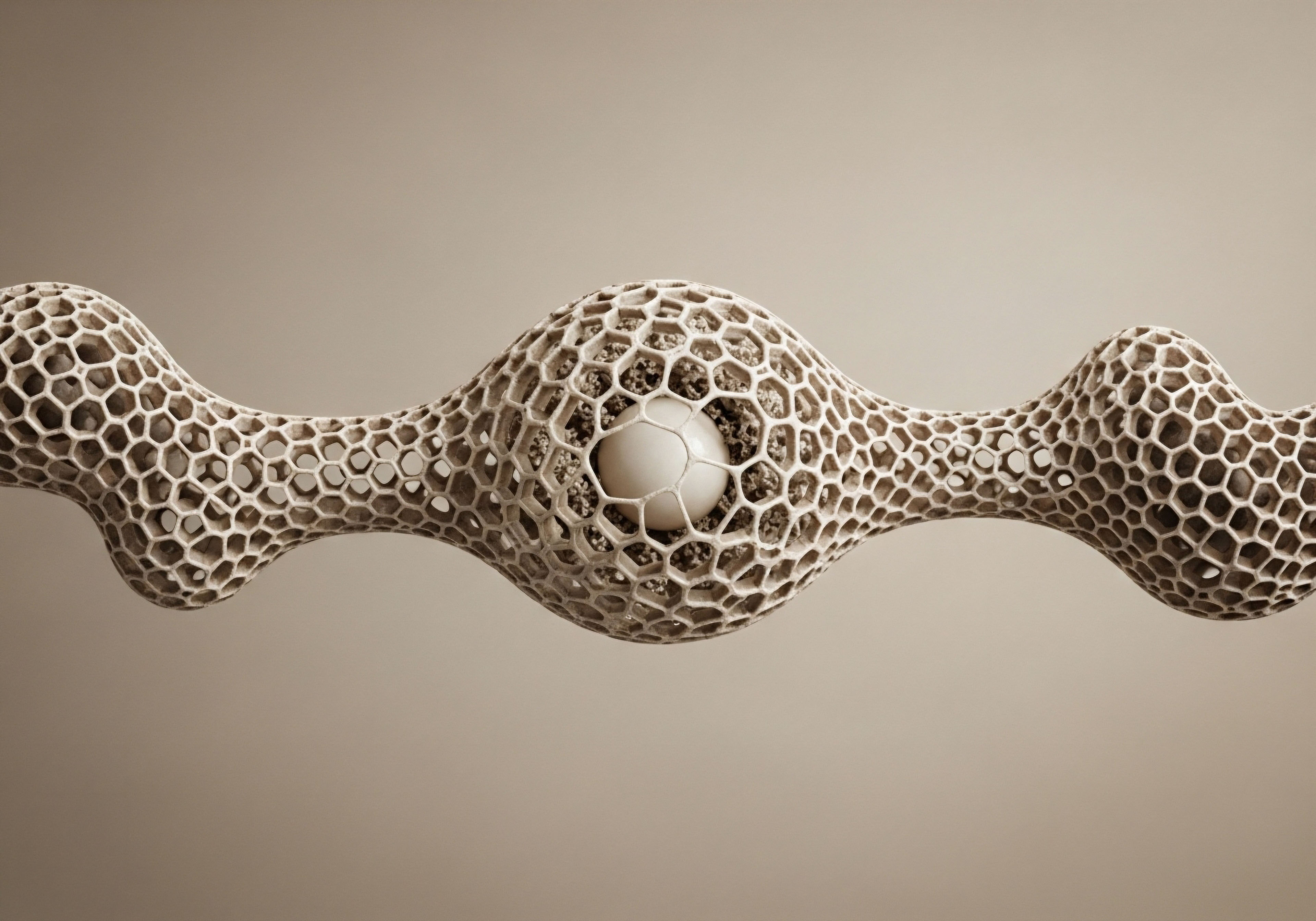

Fundamentals
Have you ever woken up feeling a profound sense of exhaustion, as if your body and mind were still caught in a fog, despite having spent hours in bed? This pervasive weariness, a sensation many men experience, often extends beyond simple tiredness.
It can manifest as a subtle yet persistent drain on your energy, a diminished drive, or even a quiet frustration with your physical and mental capabilities. This feeling, a disconnect between your aspirations and your daily capacity, frequently signals an underlying imbalance within your biological systems. It is a signal from your body, indicating that something fundamental is not quite right, and often, the silent culprit is the quality of your sleep.
Our bodies operate through an intricate network of internal communications, a sophisticated messaging service where chemical messengers, known as hormones, transmit vital instructions throughout the system. These chemical signals regulate nearly every physiological process, from your mood and energy levels to your physical strength and cognitive sharpness. When this delicate communication system is disrupted, the consequences ripple across your entire being, impacting your sense of vitality and overall function.
Sleep, far from being a passive state of rest, serves as a dynamic period of restoration and recalibration for these essential biological systems. During sleep, your body performs critical maintenance tasks, repairing tissues, consolidating memories, and, significantly, orchestrating the rhythmic release of hormones. This nightly reset is not merely about feeling refreshed; it is about ensuring the proper functioning of your endocrine system, the collection of glands that produce and secrete hormones.
Adequate sleep is a fundamental pillar supporting the body’s intricate hormonal communication network.
Central to male hormonal health is the Hypothalamic-Pituitary-Gonadal (HPG) axis, a complex feedback loop involving three key glands ∞ the hypothalamus in the brain, the pituitary gland also in the brain, and the gonads (testes) in men.
The hypothalamus initiates the process by releasing Gonadotropin-Releasing Hormone (GnRH), which then prompts the pituitary gland to secrete Luteinizing Hormone (LH) and Follicle-Stimulating Hormone (FSH). These pituitary hormones, in turn, stimulate the testes to produce testosterone, the primary male sex hormone. This axis functions like a precise thermostat, constantly adjusting hormone production based on the body’s needs and existing levels.
When sleep quality declines, this finely tuned HPG axis can experience significant disruption. Insufficient sleep or fragmented sleep patterns can interfere with the natural pulsatile release of GnRH, LH, and FSH, leading to a downstream reduction in testosterone production. This impact is not immediate or always overtly dramatic, but rather a gradual erosion of hormonal equilibrium that can manifest as a persistent decline in well-being. Understanding this foundational connection is the first step toward reclaiming your vitality.

How Does Sleep Deprivation Affect Hormonal Rhythm?
The human body operates on a roughly 24-hour cycle, known as the circadian rhythm, which dictates sleep-wake patterns, hormone secretion, and other physiological processes. This internal clock is profoundly influenced by light and darkness, signaling to the brain when to be alert and when to prepare for rest. Hormones like testosterone and cortisol exhibit distinct circadian patterns, with testosterone typically peaking in the morning and cortisol levels generally highest upon waking.
Disrupting this natural rhythm through poor sleep directly interferes with these hormonal oscillations. For instance, the majority of daily testosterone secretion in men occurs during sleep, particularly during the deeper stages of sleep. When sleep is cut short or frequently interrupted, the body misses crucial windows for optimal testosterone synthesis and release. This can lead to chronically lower circulating testosterone levels, even in otherwise healthy individuals.
- Testosterone Production ∞ Deep sleep stages are essential for the pulsatile release of Luteinizing Hormone (LH), which stimulates testosterone synthesis in the testes.
- Cortisol Regulation ∞ Poor sleep can elevate evening cortisol levels, a stress hormone, which can suppress testosterone production and disrupt metabolic balance.
- Growth Hormone Release ∞ The largest daily release of Growth Hormone (GH) occurs during deep sleep, vital for tissue repair, muscle maintenance, and metabolic regulation.


Intermediate
Moving beyond the foundational understanding, we can explore the specific clinical implications of sleep quality on male hormonal balance and how this knowledge informs personalized wellness protocols. The body’s endocrine system is not a collection of isolated components; it is a symphony where each instrument influences the others. Sleep acts as the conductor, ensuring each section plays in harmony. When the conductor falters, the entire performance suffers, leading to a cascade of effects on key hormones.

Specific Hormonal Responses to Sleep Disruption
The impact of inadequate sleep extends beyond a general sense of fatigue, directly influencing the production and regulation of several vital male hormones. Each hormone plays a distinct role, and their collective balance is paramount for overall well-being. Understanding these specific interactions helps us appreciate the systemic consequences of sleep deficits.

Testosterone and Sleep Architecture
Testosterone, a cornerstone of male vitality, exhibits a clear dependence on sleep. Studies consistently show that significant portions of daily testosterone production occur during sleep, particularly during the deeper phases of Non-Rapid Eye Movement (NREM) sleep. When sleep is restricted or fragmented, the nocturnal surge in testosterone is blunted.
This is not simply a matter of total sleep duration; the quality and continuity of sleep, specifically the amount of time spent in slow-wave sleep, appear to be critical for optimal testosterone pulsatility. A consistent lack of restorative sleep can lead to a gradual, yet significant, decline in circulating testosterone levels, contributing to symptoms often associated with age-related hormonal changes.

Cortisol and the Stress Response
The body’s primary stress hormone, cortisol, also follows a distinct circadian rhythm, typically peaking in the morning and gradually declining throughout the day to its lowest point before sleep. Chronic sleep deprivation, however, can disrupt this natural pattern, leading to elevated evening cortisol levels.
Sustained high cortisol can have a suppressive effect on the HPG axis, directly inhibiting the production of GnRH and LH, which in turn reduces testosterone synthesis. This creates a vicious cycle ∞ poor sleep elevates stress hormones, which then further compromise the production of anabolic hormones like testosterone.
Disrupted sleep elevates stress hormones, which can suppress testosterone production and metabolic health.

Growth Hormone and Cellular Repair
Another hormone profoundly affected by sleep is Growth Hormone (GH). The largest and most significant pulsatile release of GH occurs during the initial hours of deep NREM sleep. GH is vital for cellular repair, muscle protein synthesis, fat metabolism, and overall tissue regeneration.
When sleep is insufficient or of poor quality, the nocturnal release of GH is significantly diminished. This reduction can impair the body’s ability to recover from daily stressors, hinder muscle growth and repair, and contribute to an unfavorable body composition, including increased visceral fat.

Integrating Sleep Optimization into Wellness Protocols
For individuals seeking to optimize their hormonal health, addressing sleep quality is not merely an adjunct; it is a foundational element. Personalized wellness protocols, such as Testosterone Replacement Therapy (TRT) or Growth Hormone Peptide Therapy, can be significantly enhanced by concurrent sleep optimization. Ignoring sleep while pursuing hormonal interventions is akin to trying to fill a leaky bucket; the underlying issue continues to undermine progress.
Consider a man experiencing symptoms of low testosterone, such as reduced energy, diminished libido, and difficulty maintaining muscle mass. While a protocol involving weekly intramuscular injections of Testosterone Cypionate (200mg/ml), alongside Gonadorelin (2x/week subcutaneous injections) to maintain natural production, and Anastrozole (2x/week oral tablet) to manage estrogen conversion, can be highly effective, its full potential may not be realized without addressing sleep.
If this individual consistently sleeps poorly, the body’s inherent capacity for hormonal regulation remains compromised, potentially necessitating higher doses or experiencing suboptimal outcomes.
Similarly, for active adults and athletes utilizing Growth Hormone Peptide Therapy with agents like Sermorelin or Ipamorelin / CJC-1295 to support anti-aging, muscle gain, and fat loss, the efficacy of these peptides is intrinsically linked to natural GH pulsatility.
Since these peptides work by stimulating the body’s own GH release, ensuring robust deep sleep, where the majority of endogenous GH is secreted, becomes paramount. Without adequate deep sleep, the body’s response to these peptides may be less pronounced, limiting the desired physiological benefits.

Practical Steps for Sleep Optimization
Implementing targeted sleep hygiene practices can significantly improve hormonal balance. These practices aim to reinforce the body’s natural circadian rhythm and promote restorative sleep stages.
- Consistent Sleep Schedule ∞ Going to bed and waking up at the same time each day, even on weekends, helps regulate your internal clock.
- Optimized Sleep Environment ∞ Ensure your bedroom is dark, quiet, and cool. Eliminating light sources and minimizing noise can greatly enhance sleep quality.
- Limit Evening Stimulants ∞ Avoid caffeine and nicotine, especially in the afternoon and evening, as they can interfere with sleep onset and continuity.
- Mindful Evening Routine ∞ Engage in relaxing activities before bed, such as reading, gentle stretching, or a warm bath, to signal to your body that it is time to wind down.
- Manage Screen Time ∞ Reduce exposure to blue light from electronic devices in the hours leading up to sleep, as it can suppress melatonin production, a hormone that promotes sleepiness.
The table below illustrates the potential differences in hormonal profiles between individuals with optimal sleep and those experiencing chronic sleep disruption. This comparison underscores the profound impact of sleep on endocrine function.
| Hormone | Optimal Sleep Profile | Chronic Sleep Disruption Profile |
|---|---|---|
| Testosterone | Robust morning peak, healthy pulsatile release during deep sleep. | Blunted morning peak, reduced overall daily production, impaired pulsatility. |
| Cortisol | Clear morning peak, gradual decline throughout the day, low evening levels. | Elevated evening levels, flattened diurnal rhythm, increased overall exposure. |
| Growth Hormone | Significant pulsatile release during early deep sleep. | Diminished nocturnal release, reduced overall daily secretion. |
| Insulin Sensitivity | High, efficient glucose utilization. | Reduced, increased risk of insulin resistance and metabolic dysregulation. |
| Leptin/Ghrelin | Balanced, appropriate hunger and satiety signals. | Imbalance, increased hunger (ghrelin) and reduced satiety (leptin), contributing to weight gain. |


Academic
To truly comprehend the intricate relationship between sleep quality and male hormonal balance, we must delve into the underlying neuroendocrine and metabolic pathways. This requires a systems-biology perspective, recognizing that the body’s various axes and feedback loops are in constant, dynamic communication. The impact of sleep extends far beyond the direct regulation of specific hormones, influencing systemic inflammation, metabolic efficiency, and even genetic expression.

Neuroendocrine Interplay and Sleep Architecture
The profound influence of sleep on hormonal regulation is mediated through complex interactions within the central nervous system and the endocrine glands. The hypothalamic-pituitary-adrenal (HPA) axis, responsible for the body’s stress response, is particularly sensitive to sleep deprivation.
Chronic sleep restriction activates the HPA axis, leading to sustained elevation of corticotropin-releasing hormone (CRH) from the hypothalamus, adrenocorticotropic hormone (ACTH) from the pituitary, and ultimately, cortisol from the adrenal glands. This sustained cortisol elevation can directly inhibit GnRH pulsatility from the hypothalamus and LH secretion from the pituitary, thereby suppressing testicular testosterone production. This is a direct neuroendocrine mechanism by which sleep stress translates into hypogonadism.
Furthermore, the specific stages of sleep play distinct roles in hormonal orchestration. Slow-wave sleep (SWS), or deep sleep, is the primary period for the pulsatile release of Growth Hormone (GH). The amplitude and frequency of GH pulses are significantly correlated with SWS duration and intensity.
Disruptions to SWS, common in conditions like sleep apnea or chronic insomnia, directly impair GH secretion, impacting cellular repair, protein synthesis, and fat oxidation. Conversely, Rapid Eye Movement (REM) sleep, while less directly linked to testosterone pulsatility than SWS, is critical for cognitive function and emotional regulation, which indirectly influence overall physiological stress and, by extension, hormonal balance.
Sleep stages, particularly deep sleep, are essential for optimal growth hormone and testosterone pulsatility.

Metabolic and Inflammatory Consequences
The repercussions of poor sleep on male hormonal balance are not confined to the endocrine system; they extend deeply into metabolic function and systemic inflammation. Chronic sleep deprivation is a recognized risk factor for insulin resistance, a condition where cells become less responsive to insulin, leading to elevated blood glucose levels.
This metabolic dysregulation can independently contribute to lower testosterone levels, as insulin resistance is often associated with reduced sex hormone-binding globulin (SHBG), which can alter the bioavailability of testosterone.
Moreover, inadequate sleep can trigger a state of low-grade systemic inflammation. This involves the upregulation of pro-inflammatory cytokines, such as Interleukin-6 (IL-6) and Tumor Necrosis Factor-alpha (TNF-α). These inflammatory mediators can directly interfere with Leydig cell function in the testes, impairing testosterone synthesis. They can also affect the sensitivity of target tissues to hormones, further exacerbating the effects of hormonal imbalances. This inflammatory cascade creates a hostile internal environment for optimal endocrine function.

Advanced Diagnostic Considerations
When evaluating male hormonal health, a comprehensive assessment must consider sleep quality as a primary variable. Beyond standard blood panels for total and free testosterone, LH, FSH, and estradiol, clinicians should investigate markers that reflect the metabolic and inflammatory consequences of sleep disruption. These might include ∞
- Fasting Insulin and Glucose ∞ To assess insulin sensitivity and metabolic health.
- HbA1c ∞ Providing a long-term measure of blood glucose control.
- High-Sensitivity C-Reactive Protein (hs-CRP) ∞ A marker of systemic inflammation.
- Sleep Studies (Polysomnography) ∞ For individuals with suspected sleep disorders like sleep apnea, which can severely disrupt sleep architecture and hormonal rhythms.
For men undergoing Testosterone Replacement Therapy (TRT), optimizing sleep can influence the efficacy and required dosage of exogenous testosterone. If endogenous production is suppressed by poor sleep, addressing this foundational issue can potentially lead to better outcomes with lower doses of testosterone, or a more stable hormonal profile.
Similarly, in Post-TRT or Fertility-Stimulating Protocols, where agents like Gonadorelin, Tamoxifen, and Clomid are used to restore natural testosterone production and fertility, robust sleep is essential for the HPG axis to regain its natural pulsatility and responsiveness.
The integration of sleep optimization into these advanced protocols is not merely additive; it is synergistic. It allows the body’s innate regulatory mechanisms to function more effectively, enhancing the therapeutic benefits of targeted interventions. This holistic perspective acknowledges that true hormonal balance is a product of interconnected systems, with sleep serving as a powerful, yet often underestimated, modulator.
| Peptide/Agent | Primary Mechanism | Sleep-Related Benefit |
|---|---|---|
| Sermorelin | Growth Hormone-Releasing Hormone (GHRH) analog, stimulates pituitary GH release. | Can enhance natural GH pulsatility, particularly during deep sleep, improving recovery and body composition. |
| Ipamorelin / CJC-1295 | Growth Hormone Secretagogues (GHS), stimulate GH release through different pathways. | Promote more robust GH secretion, which is naturally highest during deep sleep, supporting cellular repair and vitality. |
| MK-677 | Oral Growth Hormone Secretagogue, mimics ghrelin’s action. | Increases GH and IGF-1 levels, can improve sleep quality and duration, especially deep sleep, contributing to anabolic processes. |
| Tesamorelin | GHRH analog, primarily used for visceral fat reduction. | By stimulating GH, it indirectly supports metabolic health, which is often compromised by poor sleep. |

References
- Leproult, Rachel, and Eve Van Cauter. “Effect of 1 Week of Sleep Restriction on Testosterone Levels in Young Healthy Men.” JAMA 312, no. 12 (2014) ∞ 1228-1229.
- Cortes-Castillo, Manuel, et al. “Sleep Duration and Quality and Their Association with Testosterone Levels in Men ∞ A Systematic Review and Meta-Analysis.” Andrology 9, no. 6 (2021) ∞ 1779-1790.
- Vgontzas, Alexandros N. et al. “Sleep Deprivation and Hormonal Secretion.” Sleep Medicine Clinics 1, no. 2 (2006) ∞ 183-192.
- Lopresti, Adrian L. et al. “Effects of Sleep Deprivation on Hormonal and Metabolic Parameters ∞ A Systematic Review.” Sleep Medicine Reviews 57 (2021) ∞ 101464.
- Spiegel, Karine, et al. “Impact of Sleep Debt on Metabolic and Endocrine Function.” The Lancet 354, no. 9188 (1999) ∞ 1435-1439.
- Pardue, Andrew, et al. “The Effects of Sleep Deprivation on Testosterone Levels in Healthy Men ∞ A Systematic Review.” Journal of Clinical Sleep Medicine 18, no. 1 (2022) ∞ 157-164.
- Van Cauter, Eve, and Kenneth S. Polonsky. “Sleep and Endocrine Rhythms.” Endocrine Reviews 26, no. 5 (2005) ∞ 717-738.
- Dattilo, Marco, et al. “Sleep and Muscle Recovery ∞ Endocrinological and Molecular Basis for a Bi-Directional Relationship.” Clinical Physiology and Functional Imaging 38, no. 2 (2018) ∞ 131-142.

Reflection
As we conclude this exploration, consider the profound implications of sleep quality on your own hormonal landscape. This journey into the interconnectedness of your biological systems is not merely an academic exercise; it is an invitation to introspection. How might a deeper understanding of your sleep patterns transform your daily experience? What subtle shifts in your energy, mood, or physical capacity might be signaling a need for greater attention to this fundamental aspect of your well-being?
The knowledge shared here serves as a compass, guiding you toward a more informed and proactive approach to your health. Your body possesses an incredible capacity for balance and restoration, and by honoring its needs, particularly its need for restorative sleep, you begin to unlock its full potential. This is a personal path, and recognizing the power you hold in influencing your own biological systems is the most significant step toward reclaiming vitality and function without compromise.



